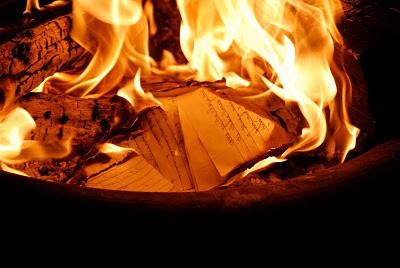This sponsored post was prepared by Professor Barry York, Dean of Faculty at Reformed Presbyterian Theological Seminary.
I knew the day would come.
 My life, like yours, is becoming increasingly a digital one. I am moving away from filing papers to storing items electronically. I knew one day those three big, rusting, steel filing cabinets in our basement, sitting there like artifacts in a museum in that they remind you of the past but are rarely visited, would be emptied and removed. Why keep paper files of items already stored on multiple devices and backed up in the cloud?
My life, like yours, is becoming increasingly a digital one. I am moving away from filing papers to storing items electronically. I knew one day those three big, rusting, steel filing cabinets in our basement, sitting there like artifacts in a museum in that they remind you of the past but are rarely visited, would be emptied and removed. Why keep paper files of items already stored on multiple devices and backed up in the cloud?
The past few days it finally happened. A desire to declutter our basement drove me to it. What satisfaction it was to haul those cabinets out to the curb and, literally within minutes, have someone stop by in a pickup truck and take them away to be scrapped.
Yet the joy of being free of the cabinets’ bulkiness turned into unexpected melancholy as I pulled the wagon filled with their contents over to the fire pit. Now it was time to burn these papers, which mostly meant for me watching over two decades of my sermons go up in flames.
My mentor had taught me his sermon writing tips, which I dutifully practiced over the years. Half sheets of paper worked best, as you could tuck them into your Bible. That way, you could carry them securely in place without them sticking out. Once preached, sliding them into 6 x 9 inch manila envelopes made for good storage. So much of my life and ministry were on those pages.
I lit the fire. I watched as the flames first teasingly licked slowly over the files and envelopes, as if not quite sure of the taste. But then they picked up a hungry intensity and began to eat away at the contents. As I threw small bundles of envelopes on the fire, titles of messages caught my attention. Like the bursts of flame, flashes of emotion struck my heart as the titles brought to mind occasions, peoples’ faces, or a particular preaching moment. Sometimes an envelope would burn off and, as if the fire was preaching back to me my own message, one page would be exposed, begin to darken around the edges, then peel off into the flames to reveal the next page.
Dusk came. Ashes floated through the air, the white flakes gently landing around our yard prompting inquiries from my children. When told what they were from, they responded with some of the same sadness I was feeling and then went on with their evening.
As darkness fell, I reflected more on the nature of preaching. Is it not to be a sacrifice by fire, an offering to the Lord that one prays is blessed by the Spirit’s fiery power to touch hearts and lives of the hearers? Are not the opportunities to preach quite limited? Is not the preaching moment itself so fleeting? More melancholy came over me there in the dark by the fire, as I thought of so many failings in sincerity, in urging, in preaching for conversions, in mindfulness of the eternity that every hearer faces, in upholding the greatness of our God who Himself is a consuming fire. Prayers of repentance ascended up with the smoke and flames.
To celebrate the end of the school year, some students in my homiletics class and I arranged to watch a documentary on D. Martyn Lloyd-Jones’ life and ministry. What moved us most was hearing Lloyd-Jones’ actual voice, as portions of his recorded sermons played as scenes of an empty Westminster Chapel moved across the screen. You could hear in his voice a holy, humble, growing intensity as he proclaimed in simple sincerity God’s Word, and imagined what it would have been like to sit there and be moved by the Spirit speaking through him. The movie’s title, a phrase from Lloyd-Jones’ own concise definition of what true preaching is, was apt: Logic on Fire.
No, we preachers cannot all be a Lloyd-Jones nor should we strive to be. Yet in this short life can we not pray that more of that Spirit that lit him would ignite the hearts of men across the land that step behind our pulpits? Can we not pray that every Lord’s Day and throughout the week true sacrifices by fire would be offered in their preaching? That ministers like the prophets of old would be having such encounters with God that they speak with His fire? As another preacher once said, if we want revival, it needs to be brought to the pulpit.
Learn more about Reformed Presbyterian Theological Seminary at RPTS.edu.











